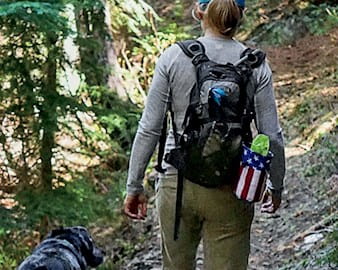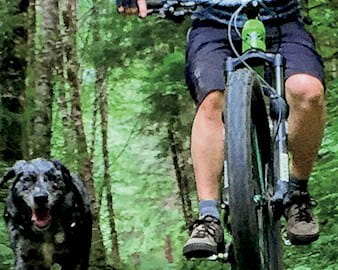
REI’s commitment to environmental stewardship is a core value for the co-op. An alumna is applying the skills she learned at Chicago Booth to connect this value to business strategy.
- By
- January 10, 2019
- Social Impact

A commitment to sustainability is infused throughout the culture and operations at REI, the outdoor-gear retailer headquartered in Kent, Washington. “We believe an outdoor life is a life well lived,” said REI’s sustainability initiative manager Sue Long, ’95. “It’s really fun to work at a place where everyone shares this value.”
From promoting green building design to reducing waste in stores, Long implements elegant, thoughtful systems that begin and end with sustainability. She draws from her background as a chemical engineer to reduce waste, streamline efficiencies, and respect the Earth, all while helping REI achieve business goals.
5:45 AM My day starts with push-ups and stretching and playing with our Aussiedor, Hazel. My husband, Brian Sundberg, makes me French press coffee to take with me to work. We’re partial to beans from Starbucks, where I worked for 20 years, in manufacturing operations and sustainability.

7 AM The van pool picks me up. The commute to the REI headquarters gives me time to meditate. I use an app called Pranayama, which has a nice breathing-pattern guide. With the last few minutes, I practice Japanese or Spanish on Duolingo.
8 AM The sustainability team gathers for our weekly kaizen meeting, which is part of a lean methodology all of REI is implementing. We use this informal meeting to address small improvements to our processes, like streamlining how we respond to customer inquiries. The goal is to make the easy things easier so we can work on the hard things.
9 AM Everyone heads outside for our department meeting (sustainability is part of the brand stewardship and impact team). We all grab camp chairs, circle up on the lawn, and share what we’re working on. I love how cross-functional my job is. From philanthropy and policy to supply chain and retail, our group touches every aspect of the company.
10 AM Next is a walking meeting with office facilities, where we visit our composting, recycling, and waste stations all around campus. We’re underway designing a system for REI’s new headquarters. Efficiency and ease of use are key. We look for opportunities to tweak and improve the stations to make proper sorting easier.
11:30 AM It’s time for lunch at the REI campus café. The manager tells me the base of today’s soup is yesterday’s roasted vegetables. As evidenced in their sourcing local produce and reusable serveware, the staff here is committed to minimizing waste and environmental impact.

1 PM I have a virtual meeting with several store managers representing different regions. They’re sharing ideas employees have brainstormed about reducing waste. We’re driving toward Zero Waste in REI stores by 2020. It’s gratifying to work on something that’s such an engaging and important topic for everyone in the company.
2:30 PM Logistics and I get on the phone to chat about how we can recycle materials between our stores and distribution centers. There is impact just from moving our products within our own network, and it’s my job to optimize that process from an environmental standpoint. What’s cooler than designing something that doesn’t have a lot of waste and uses the least amount of energy and still accomplishes the same end?
4 PM I use the rest of my workday to read industry blogs such as GreenBiz, Grist, Resource Recycling, and Waste360 and catch up on emails. I’m always keeping my eyes open to technology developments and social and environmental trends. Sustainability is really about longer-term systems thinking and making connections that might not be immediately obvious.
5:30 PM As soon as I get home, Brian and I head out to local trails with Hazel to mountain bike (or go night skiing at Alpental in the winter). It’s the perfect way to decompress at the end of the day. When I came to the Pacific Northwest over 20 years ago, I instantly felt like I had found my lifestyle home. I love the mountains and water both being so close.
7:30 PM If we don’t head out skiing or biking, we go to the gym. We stop at our favorite local grocer on the way home to pick up fresh produce and wild-caught Pacific Northwest salmon for dinner. Local vegetables and fish are a big part of our diet, both for health reasons and because they’re more sustainable than buying packaged foods.
9 PM To end the evening, I’m reading Rising: Dispatches from the New American Shore by Elizabeth Rush. It’s a beautifully written and chilling book documenting the impacts we’re seeing due to climate change today, underscoring for me the importance of the work I do.
We'd love to hear your Booth memories, stories, connections...everything.